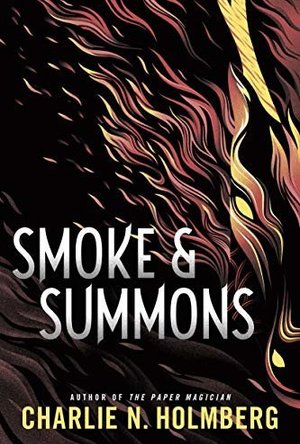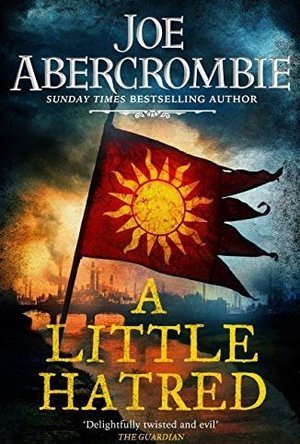Search
Ross (3284 KP) rated Smoke and Summons in Books
Mar 18, 2019 (Updated Mar 18, 2019)
Flintlock Tangled
It took me a while to realise, but this book is basically a re-telling of Tangled, the Rapunzel Disney film.
We have the young girl with magical powers who is held prisoner (though she has been trained to appreciate her captor's benevolence) by someone wanting to benefit from her powers. She meets a ne'er-do-well thief looking for that one last score before he can move and settle down. They travel together trying to find somewhere safe for her to go but are tracked down at all stops, until finally the male protagonist is persuaded to hand her in and reap the rewards, before the inevitable emotional rescue.
Rather than magical healing hair, however, Sandis has the ability to act as a vessel to demons, and is linked to a specific one (a fire horse). Her captor, Kazen, uses her abilities to bolster his gangster crew and lead the city's underworld. Upon sensing Kazen's desire to summon a more powerful demon (which is likely to kill her) she escapes and becomes embroiled with Rone, a young thief.
Together they try to track down a family member Sandis has become aware of, who may be able to help save her.
The story flows quite well, with enough strength in the main characters to engage the reader. Their travails, and Kazen's crew's neverending chase, are enjoyable and thrilling.
The narrative is good, swapping between Sandis' and Rone's perspectives and telling of their increasing tiredness and running out of options. At times, the author's American tone slips in (words like "Mom", "they were a ways from their lodgings" etc), which would normally be fine, I'm not that big of a snob, but it really comes at odds with the majority of the narrative and does stand out.
The setting is more early industrial revolution than more medieval, so there is the use of firearms to spice up the action.
A few times, events become a little hard to accept - quite how quickly and persistently Kazen's goons catch up with them, and how easily Rone manages to accomplish his rescue seem quite hard to believe.
Overall, the story is good and while the format of "lets go here, oh they've somehow found us again" becomes a little tiring, the book is short enough for this not to be too much of an issue.
We have the young girl with magical powers who is held prisoner (though she has been trained to appreciate her captor's benevolence) by someone wanting to benefit from her powers. She meets a ne'er-do-well thief looking for that one last score before he can move and settle down. They travel together trying to find somewhere safe for her to go but are tracked down at all stops, until finally the male protagonist is persuaded to hand her in and reap the rewards, before the inevitable emotional rescue.
Rather than magical healing hair, however, Sandis has the ability to act as a vessel to demons, and is linked to a specific one (a fire horse). Her captor, Kazen, uses her abilities to bolster his gangster crew and lead the city's underworld. Upon sensing Kazen's desire to summon a more powerful demon (which is likely to kill her) she escapes and becomes embroiled with Rone, a young thief.
Together they try to track down a family member Sandis has become aware of, who may be able to help save her.
The story flows quite well, with enough strength in the main characters to engage the reader. Their travails, and Kazen's crew's neverending chase, are enjoyable and thrilling.
The narrative is good, swapping between Sandis' and Rone's perspectives and telling of their increasing tiredness and running out of options. At times, the author's American tone slips in (words like "Mom", "they were a ways from their lodgings" etc), which would normally be fine, I'm not that big of a snob, but it really comes at odds with the majority of the narrative and does stand out.
The setting is more early industrial revolution than more medieval, so there is the use of firearms to spice up the action.
A few times, events become a little hard to accept - quite how quickly and persistently Kazen's goons catch up with them, and how easily Rone manages to accomplish his rescue seem quite hard to believe.
Overall, the story is good and while the format of "lets go here, oh they've somehow found us again" becomes a little tiring, the book is short enough for this not to be too much of an issue.

Makers at Work: Folks Reinventing the World One Object or Idea at a Time
Book
What do you get when you combine an electronics hobbyist, hacker, garage mechanic, kitchen table...
Ross (3284 KP) rated A Little Hatred in Books
Oct 1, 2019
The latest instalment in the world of the First Law is the start of Abercrombie's new series - The Age of Madness. The story take place some 30 years after the events of the First Law trilogy, and we are deep into that world's industrial revolution. Across the Union, tradesmen are being rendered obsolete by technological advancement. Savine dan Glokta, the daughter of the shining, shitty star of the First Law trilogy, has made her fortune by investing in such innovations and mercilessly milking their genius inventors for every mark of profit. Half of the story follows her on a trip to oversee the running of one of her investments, a trip which soon descends into riot, hostage-taking and a general shit-storm.
The rest of the story takes place in the North, where those Northmen are, once more, kicking up a fuss and trying to reclaim their land from the Union. These chapters focus on Rikke, the dogman's daughter, and Leo dan Brock, the Young Lion, as they fight against Black Calder and his crew.
Yes, this really is "First Law: The Next Generation". With very few exceptions, the main characters here are all the descendants of characters from the previous trilogy. What I couldn't quite come to terms with was the fact that Caul Shivers and Bremer dan Gorst seemed to have aged significantly less than I might have expected (based purely on my impression of their ages in the earlier books and other characters now).
The battle with the Northmen was pretty much a boiled-down version of the Heroes, and not all that enjoyable. Rikke was a new feature which just about saved this from utter tedium.
There was one exceptional scene revolving around the riot that Savine found herself in. This scene changed from one perspective to another seamlessly, truly like a scene from a film. This long chapter was so engaging and immersive I couldn't leave it unfinished.
Abercrombie's writing and dialogue once again shine through as top of the class.
However, what held the book back for me were the pace of the opening third (so much character introduction and yet so much of it is left to the reader based on the previous books), and the bulk of the chapters in the North. The rest of the book really felt new and exciting and thrilling, those sections really just felt like old hat.
The rest of the story takes place in the North, where those Northmen are, once more, kicking up a fuss and trying to reclaim their land from the Union. These chapters focus on Rikke, the dogman's daughter, and Leo dan Brock, the Young Lion, as they fight against Black Calder and his crew.
Yes, this really is "First Law: The Next Generation". With very few exceptions, the main characters here are all the descendants of characters from the previous trilogy. What I couldn't quite come to terms with was the fact that Caul Shivers and Bremer dan Gorst seemed to have aged significantly less than I might have expected (based purely on my impression of their ages in the earlier books and other characters now).
The battle with the Northmen was pretty much a boiled-down version of the Heroes, and not all that enjoyable. Rikke was a new feature which just about saved this from utter tedium.
There was one exceptional scene revolving around the riot that Savine found herself in. This scene changed from one perspective to another seamlessly, truly like a scene from a film. This long chapter was so engaging and immersive I couldn't leave it unfinished.
Abercrombie's writing and dialogue once again shine through as top of the class.
However, what held the book back for me were the pace of the opening third (so much character introduction and yet so much of it is left to the reader based on the previous books), and the bulk of the chapters in the North. The rest of the book really felt new and exciting and thrilling, those sections really just felt like old hat.

The Triumph of Seeds: How Grains, Nuts, Kernels, Pulses, and Pips, Conquered the Plant Kingdom and Shaped Human History
Book
Winner of the 2016 PNBA Book Award A finalist for the 2016 AAAS/Subaru SB&F Prize for Excellence in...

GSVExplorer
Navigation and Travel
App
Search and view Google street view from a visible map region Features - Tap on map view to search...
Mandy and G.D. Burkhead (26 KP) rated Poison Study (Study, #1) in Books
May 20, 2018
Shelf Life – The Chronicles of Ixia merits closer study
Contains spoilers, click to show
This review is for the entire Chronicles of Ixia series.
The first trilogy, comprised of Poison Study, Fire Study, and Magic Study, follows Yelena Zaltana. The second series, also called the Glass series, follows her friend Opal Cowan in Storm Glass, Sea Glass, and Spy Glass. The final trilogy, Shadow Study, Night Study, and Dawn Study, is where things get a bit odd. Maria V. Snyder had thrown in a few short stories/novellas throughout from different characters’ points of view. Perhaps she got bored of just sticking to one POV, or maybe fans wanted more from the other characters, so the third trilogy is from Yelena’s POV in first person and the POV’s of multiple characters (mainly Valek, Leif, and Janco, with a few others popping in from time to time) in third person.
I’m not sure which editor thought it would be a good idea to have POV switch from first person to third person in the same novel, but—yikes—is it jarring. Even with the wonky POV stuff in the third trilogy, these books are amazing and absolutely worth your time to read. Snyder’s world-building is compelling, detailed, and original. The books take place mostly between two pre-industrial countries: Ixia and Sitia. Ixia is a post-revolution country ruled by Commander Ambrose. His personal body guard and assassin is Valek. In the first novel Yelena is in prison for murder and is offered the choice to be the Commander’s food taster in exchange for her life. She agrees, and throughout the first book she and Valek begin to fall in love.
Ixia reminded me a lot of Communist Russia or China. In its attempts to throw away the corrupt government and society that came before, it has also thrown out all culture in the process. The country has been re-divided into districts with numbers instead of names, everyone is forced to wear a uniform, all art and extravagance has been destroyed, people have to have passes to travel between districts, and magic is forbidden. Anyone born with it is killed (or so the reader is led to believe). But Maria V. Snyder does a wonderful job of showing the good with the bad in this totalitarian dictatorship. Everyone has a job and nobody goes hungry, women are now equal to men, and violence and sexual assault are intolerable. This is why Yelena ends up in prison in the first place: she murdered the man that raped her. Now, this is probably my first major gripe with the series. We learn that Commander Ambrose loathes sexual assault and will execute anyone found guilty of it, but apparently killing a rapist in self-defense is also an executable offense. And all of that being said, Ambrose still has his own personal assassin. It all feels a bit contradictory, but again, that’s what I like about this series: it does an excellent job of peeling back the layers of her fictional societies and pointing out that governments and people in power tend to be hypocritical.
Now, the series name (or rather one of them) is Chronicles of Ixia, but honestly, it should have been called Chronicles of Sitia, because that is where most of the story takes place and is by far the more interesting and vibrant country. Sitia is part jungle, part desert, and full of magic. The peoples are divided into multiple clans or tribes that are all unique and compelling. In the second book, Yelena flees to Sitia after the Commander learns she has magic, and there she finds the family she was kidnapped from as a small child. They are part of the Zaltana clan, a group of people that live high in the trees in the jungle. Whenever I read about them, I would have to remind myself that they were not wood elves or dryads, because while there is magic in these books, there are no fantastical creatures: all characters are human or animal.
Another fascinating tribe is the Sandseeds, a group of nomads in the desert known for two major things: breeding super smart horses and having Storyweavers. The Storyweavers are people who have the magical ability to see the future and guide others, but who have to do it really cryptically because reasons (I appreciate that this gets pointed out by an annoyed Yelena multiple times). And of course, the Sandseed horses are fantastic; they choose their rider and able to mentally communicate with magical people. They even have their own horse names for people that they like.
Besides the different clans throughout Sitia, there is also the capitol, the Citadel, which is home to the magic school and the Sitian Council. While very different from Ixia, Sitia is by no means perfect. Its Council epitomizes everything annoying and dysfunctional about a bureaucracy. While the council members are elected and come from every clan in Sitia, they are at best useless and at worst actively impede the main characters.
The magic school is interesting, though the story doesn’t actually spend much time there. I like how magic was done in this series: it usually runs in families, most people with it have control over one or two things (ie. fire, mind-control, telepathy, etc.), but those who have the ability to master more can become Master Magicians after enduring a daunting trial. Magic is bound in people’s blood, so blood magic is a thing and is obviously bad, and magic (and a person’s soul) can be stolen using an intricate and gruesome blood ritual that involves prolonged torture, rape, and then murder.
The power blanket is another interesting concept used in this series. Essentially is resides over the entire world and is the essence of magic, so magicians can pull from it to augment their own magic. However, if they pull too much and lose control, they can flame out, killing themselves and temporarily damaging the blanket in the process. I thought this was a good literary tool to prevent magical characters from being too OP (at least most of the time).
I especially like the romantic relationships in this series. Valek and Yelena are of course the main couple. In the first book they fall in love, in the second book they get separated, and throughout the series they regularly cross paths and save one another. Yelena and Valek are heartmates, and as the series progresses they both have to mature and learn how to trust one another. My biggest complaint about the romance is that all sex scenes are just fade to black, which I personally find a bit boring.
The other major romantic relationship is between Opal and Devlen. This one was a bit awkward. Opal actually goes through a couple of guys first: a stormdancer named Kade and another glassmaker named Ulrick. And I really liked that the author included this. Many people have multiple partners before finding their soulmate, and a woman who does is not a slut. Her relationship with Devlen, however . . . Well, she’s a more forgiving person than me.
You see, it turns out that Devlen is the man who kidnapped Opal a few years earlier and tortured her because he was trying to steal her magic. But he didn’t actually enjoy torturing her and never raped her, which I guess makes it better? Well, he manages to switch bodies with Ulrick and, as Ulrick, tricks Opal into dating him, then, when he’s discovered, kidnaps and tortures her (again) to gain more power. But then she steals his magic, he spends some time in prison, and the combination of the two miraculously turn him into a good guy, claiming that magic is what made him evil in the first place.
I’m going to be honest, I didn’t completely buy his redemption arc even at the end of the third book in the Glass series, but by the ninth book they’re still together and he’s on the good guys’ side, so I guess it was real. And I have definitely watched/read much worse evil asshole to boyfriend stories. At least Devlen genuinely feels guilty for the horrible things he did in the past and attempts to make up for them, and in her defense, Opal has to do a lot of soul-searching before she can find it in her to forgive and trust him, and even more before she can develop romantic feelings for him (that aren’t based on deception, anyway). Also, Ulrick becomes a huge jerk because of his newfound magical abilities, tries to kill Opal, and later gets assassinated by Valek. I appreciate what Maria V. Snyder is trying to do here, which is to teach through her storytelling how good people can become evil, and evil people can redeem themselves and be good. Their romance was uncomfortable to read, but it was supposed to be uncomfortable, because that’s how all parties involved felt.
Now, let’s talk about Commander Ambrose. Towards the end of the first book, Yelena discovers that Ambrose is a female to male trans person. This is revealed to be why Ambrose hates magicians so much: he is afraid that one of them will read his mind and then reveal his secret (which is how Yelena discovers it). After I read the first book, I was really pleased that Snyder did such a good job of depicting a trans person, as that’s really only a small part of his character, and those who know (mainly Valek and Yelena) don’t make a big deal out of it.
And then . . . I really wish that the author would have just left the issue of the Commander being trans alone. Yelena discovers it in the first book, she keeps it to herself because it’s nobody else’s business, the end. But by creating this weird intricate background to explain why Ambrose is trans, Snyder just kind of shoots herself in the foot.
Throughout the rest of the series, I kept hoping for some other LGBTQ+ characters to show up to redeem the blunder with Ambrose. I actually believed that Ari and Janco were a gay couple for the longest time, what with their banter and often being referred to as partners. However, if this was the author’s intention, it was never really explicitly stated, and the partner thing just seems to refer to them being partners in combat and nothing else.
The first trilogy, comprised of Poison Study, Fire Study, and Magic Study, follows Yelena Zaltana. The second series, also called the Glass series, follows her friend Opal Cowan in Storm Glass, Sea Glass, and Spy Glass. The final trilogy, Shadow Study, Night Study, and Dawn Study, is where things get a bit odd. Maria V. Snyder had thrown in a few short stories/novellas throughout from different characters’ points of view. Perhaps she got bored of just sticking to one POV, or maybe fans wanted more from the other characters, so the third trilogy is from Yelena’s POV in first person and the POV’s of multiple characters (mainly Valek, Leif, and Janco, with a few others popping in from time to time) in third person.
I’m not sure which editor thought it would be a good idea to have POV switch from first person to third person in the same novel, but—yikes—is it jarring. Even with the wonky POV stuff in the third trilogy, these books are amazing and absolutely worth your time to read. Snyder’s world-building is compelling, detailed, and original. The books take place mostly between two pre-industrial countries: Ixia and Sitia. Ixia is a post-revolution country ruled by Commander Ambrose. His personal body guard and assassin is Valek. In the first novel Yelena is in prison for murder and is offered the choice to be the Commander’s food taster in exchange for her life. She agrees, and throughout the first book she and Valek begin to fall in love.
Ixia reminded me a lot of Communist Russia or China. In its attempts to throw away the corrupt government and society that came before, it has also thrown out all culture in the process. The country has been re-divided into districts with numbers instead of names, everyone is forced to wear a uniform, all art and extravagance has been destroyed, people have to have passes to travel between districts, and magic is forbidden. Anyone born with it is killed (or so the reader is led to believe). But Maria V. Snyder does a wonderful job of showing the good with the bad in this totalitarian dictatorship. Everyone has a job and nobody goes hungry, women are now equal to men, and violence and sexual assault are intolerable. This is why Yelena ends up in prison in the first place: she murdered the man that raped her. Now, this is probably my first major gripe with the series. We learn that Commander Ambrose loathes sexual assault and will execute anyone found guilty of it, but apparently killing a rapist in self-defense is also an executable offense. And all of that being said, Ambrose still has his own personal assassin. It all feels a bit contradictory, but again, that’s what I like about this series: it does an excellent job of peeling back the layers of her fictional societies and pointing out that governments and people in power tend to be hypocritical.
Now, the series name (or rather one of them) is Chronicles of Ixia, but honestly, it should have been called Chronicles of Sitia, because that is where most of the story takes place and is by far the more interesting and vibrant country. Sitia is part jungle, part desert, and full of magic. The peoples are divided into multiple clans or tribes that are all unique and compelling. In the second book, Yelena flees to Sitia after the Commander learns she has magic, and there she finds the family she was kidnapped from as a small child. They are part of the Zaltana clan, a group of people that live high in the trees in the jungle. Whenever I read about them, I would have to remind myself that they were not wood elves or dryads, because while there is magic in these books, there are no fantastical creatures: all characters are human or animal.
Another fascinating tribe is the Sandseeds, a group of nomads in the desert known for two major things: breeding super smart horses and having Storyweavers. The Storyweavers are people who have the magical ability to see the future and guide others, but who have to do it really cryptically because reasons (I appreciate that this gets pointed out by an annoyed Yelena multiple times). And of course, the Sandseed horses are fantastic; they choose their rider and able to mentally communicate with magical people. They even have their own horse names for people that they like.
Besides the different clans throughout Sitia, there is also the capitol, the Citadel, which is home to the magic school and the Sitian Council. While very different from Ixia, Sitia is by no means perfect. Its Council epitomizes everything annoying and dysfunctional about a bureaucracy. While the council members are elected and come from every clan in Sitia, they are at best useless and at worst actively impede the main characters.
The magic school is interesting, though the story doesn’t actually spend much time there. I like how magic was done in this series: it usually runs in families, most people with it have control over one or two things (ie. fire, mind-control, telepathy, etc.), but those who have the ability to master more can become Master Magicians after enduring a daunting trial. Magic is bound in people’s blood, so blood magic is a thing and is obviously bad, and magic (and a person’s soul) can be stolen using an intricate and gruesome blood ritual that involves prolonged torture, rape, and then murder.
The power blanket is another interesting concept used in this series. Essentially is resides over the entire world and is the essence of magic, so magicians can pull from it to augment their own magic. However, if they pull too much and lose control, they can flame out, killing themselves and temporarily damaging the blanket in the process. I thought this was a good literary tool to prevent magical characters from being too OP (at least most of the time).
I especially like the romantic relationships in this series. Valek and Yelena are of course the main couple. In the first book they fall in love, in the second book they get separated, and throughout the series they regularly cross paths and save one another. Yelena and Valek are heartmates, and as the series progresses they both have to mature and learn how to trust one another. My biggest complaint about the romance is that all sex scenes are just fade to black, which I personally find a bit boring.
The other major romantic relationship is between Opal and Devlen. This one was a bit awkward. Opal actually goes through a couple of guys first: a stormdancer named Kade and another glassmaker named Ulrick. And I really liked that the author included this. Many people have multiple partners before finding their soulmate, and a woman who does is not a slut. Her relationship with Devlen, however . . . Well, she’s a more forgiving person than me.
You see, it turns out that Devlen is the man who kidnapped Opal a few years earlier and tortured her because he was trying to steal her magic. But he didn’t actually enjoy torturing her and never raped her, which I guess makes it better? Well, he manages to switch bodies with Ulrick and, as Ulrick, tricks Opal into dating him, then, when he’s discovered, kidnaps and tortures her (again) to gain more power. But then she steals his magic, he spends some time in prison, and the combination of the two miraculously turn him into a good guy, claiming that magic is what made him evil in the first place.
I’m going to be honest, I didn’t completely buy his redemption arc even at the end of the third book in the Glass series, but by the ninth book they’re still together and he’s on the good guys’ side, so I guess it was real. And I have definitely watched/read much worse evil asshole to boyfriend stories. At least Devlen genuinely feels guilty for the horrible things he did in the past and attempts to make up for them, and in her defense, Opal has to do a lot of soul-searching before she can find it in her to forgive and trust him, and even more before she can develop romantic feelings for him (that aren’t based on deception, anyway). Also, Ulrick becomes a huge jerk because of his newfound magical abilities, tries to kill Opal, and later gets assassinated by Valek. I appreciate what Maria V. Snyder is trying to do here, which is to teach through her storytelling how good people can become evil, and evil people can redeem themselves and be good. Their romance was uncomfortable to read, but it was supposed to be uncomfortable, because that’s how all parties involved felt.
Now, let’s talk about Commander Ambrose. Towards the end of the first book, Yelena discovers that Ambrose is a female to male trans person. This is revealed to be why Ambrose hates magicians so much: he is afraid that one of them will read his mind and then reveal his secret (which is how Yelena discovers it). After I read the first book, I was really pleased that Snyder did such a good job of depicting a trans person, as that’s really only a small part of his character, and those who know (mainly Valek and Yelena) don’t make a big deal out of it.
And then . . . I really wish that the author would have just left the issue of the Commander being trans alone. Yelena discovers it in the first book, she keeps it to herself because it’s nobody else’s business, the end. But by creating this weird intricate background to explain why Ambrose is trans, Snyder just kind of shoots herself in the foot.
Throughout the rest of the series, I kept hoping for some other LGBTQ+ characters to show up to redeem the blunder with Ambrose. I actually believed that Ari and Janco were a gay couple for the longest time, what with their banter and often being referred to as partners. However, if this was the author’s intention, it was never really explicitly stated, and the partner thing just seems to refer to them being partners in combat and nothing else.


